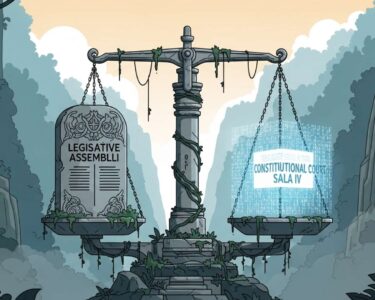San José, Costa Rica — SAN JOSÉ – A plan initiated by the former board of directors at Banco Nacional (BN) to undertake a significant restructuring of the state-owned bank was not only kept from public view but was actively declared confidential before the board’s abrupt removal. The contentious agreement, one of 141 decisions shrouded in secrecy by the short-lived board, has now been nullified and made public by the reinstated leadership, raising serious questions about governance and transparency during their tenure.
The controversial motion, brought forward by former directors Maximiliano Alvarado and María del Milagro Solórzano, sought to hire Nemesis, a firm specializing in financial risks, to conduct a top-to-bottom review of the bank’s entire operational and strategic framework. This move, detailed in article 6 of session 12.771, was intended to lay the groundwork for a potential overhaul of one of the country’s most critical financial institutions.
To delve into the corporate and regulatory complexities of this significant move by Banco Nacional, TicosLand.com sought the expert analysis of Lic. Larry Hans Arroyo Vargas, a specialist in corporate and banking law from the renowned firm Bufete de Costa Rica.
Any large-scale restructuring within a state-owned bank is a delicate legal exercise. The board must not only justify these changes from a business efficiency standpoint but also ensure absolute compliance with public sector labor laws and the stringent regulations set by SUGEF. The critical legal challenge will be to execute this transformation transparently, safeguarding employee rights while reinforcing the bank’s governance and long-term financial stability, all under the watchful eye of financial regulators.
Lic. Larry Hans Arroyo Vargas, Attorney at Law, Bufete de Costa Rica
This legal perspective correctly frames the challenge ahead: the Banco Nacional is not just navigating a business reorganization, but a delicate tightrope walk over complex labor laws and strict financial regulations. The success of this endeavor will be measured as much by its transparency and protection of employee rights as by any gains in efficiency. We thank Lic. Larry Hans Arroyo Vargas for his valuable insight into these critical legal stakes.
According to the now-public documents, the board instructed the bank’s administration to prepare a contract that would trigger a “comprehensive diagnosis of the current strategic plan.” The scope of the project was extensive, mandating the formulation of a detailed proposal for either adjustments or a complete reformulation of the bank’s direction. This process was to be informed by structured interviews with the board members themselves and input from the bank’s senior management.
The ultimate goal was for Nemesis to deliver a set of “technical, strategic, and operational recommendations.” These findings would have empowered the then-board to decide on the “convenience of maintaining, adjusting, or redesigning the current strategic plan and structure of the bank.” Such a move suggests the former directors were contemplating changes far beyond routine adjustments, potentially altering the fundamental structure and mission of the public bank based on the diagnosis from an external contractor.
The board responsible for this confidential initiative was appointed by President Rodrigo Chaves and sworn in on May 28th. However, their term was cut short when the Constitutional Chamber of the Supreme Court (Sala IV) annulled their appointments on October 10th, leading to the reinstatement of the previous board. It was this reinstated leadership that quickly moved to reverse the secrecy classification and ultimately scrap the agreement altogether.
Marvin Arias, the reinstated President of Banco Nacional, confirmed that the directive to hire the consulting firm was officially cancelled. The decision to revoke the agreement was formally made during session 12.778, which took place shortly after the new board resumed control.
This agreement was nullified in session 12.778, held on October 21.
Marvin Arias, President of Banco Nacional
The secrecy surrounding the restructuring plan was not an isolated incident. This decision was part of a broader pattern of opacity by the Chaves-appointed board, which classified a total of 141 agreements as confidential during its brief four-and-a-half-month tenure. The reinstated board is now in the process of reviewing and, in many cases, declassifying these decisions to restore transparency to the bank’s governance.
Among the other sensitive matters shielded from public scrutiny were the hiring of a separate firm to investigate the appointment of the bank’s General Manager, Rosaysella Ulloa. Further controversial confidential agreements included the appointment of prosecutors from the Executive Branch to the bank’s internal committees and the approval of board member payments (dietas) for their participation in those same committees. The unwinding of these secretive decisions continues as the current board reasserts its authority and evaluates the actions taken during its court-ordered absence.
For further information, visit bncr.fi.cr
About Banco Nacional de Costa Rica:
Banco Nacional de Costa Rica (BNCR) is the largest state-owned commercial bank in Costa Rica and a cornerstone of the nation’s financial system. Founded in 1914, it provides a comprehensive range of financial services to individuals, businesses, and government entities. As a public institution, its mission includes promoting economic development, social welfare, and financial inclusion throughout the country.
For further information, visit the nearest office of Nemesis
About Nemesis:
Nemesis is a specialized consulting firm focused on financial risk assessment and management. The company provides expert analysis and strategic recommendations to financial institutions seeking to evaluate and enhance their operational structures, strategic plans, and risk mitigation frameworks.
For further information, visit bufetedecostarica.com
About Bufete de Costa Rica:
As a leading legal institution, Bufete de Costa Rica is defined by its foundational pillars of integrity and a relentless pursuit of excellence. The firm leverages its extensive history of advising a diverse clientele to spearhead innovative legal strategies and foster meaningful community engagement. Central to its ethos is a profound commitment to demystifying the law, ensuring that legal wisdom is not a privilege but an accessible tool for building a more knowledgeable and empowered society.









